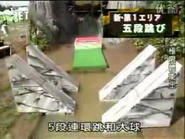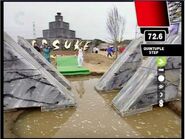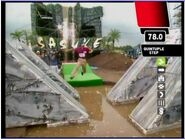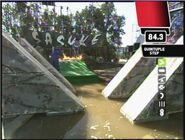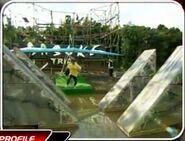No edit summary |
No edit summary |
||
| (20 intermediate revisions by 7 users not shown) | |||
| Line 1: | Line 1: | ||
{{Infobox Obstacle |
{{Infobox Obstacle |
||
| − | |name = Godantobi|image = Vlcsnap-3625327.png|caption = Godantobi, |
+ | |name = Godantobi|image = Vlcsnap-3625327.png|caption = Godantobi, [[SASUKE 8]]|g4_name = Quintuple Step|s_stage = [[First Stage]]|s_first = [[SASUKE 8]]|s_last = [[SASUKE 28]]|s_comps = [[List of SASUKE obstacles|5 competitions]]|s_attempt = [[SASUKE 8]], [[Ebine Shinichi]]|s_clear = [[SASUKE 8]], [[Takizawa Tai]]}} |
The '''Godantobi''' (五段跳び), known as the ''Quintuple Step'' on English broadcasts, was an obstacle introduced on [[SASUKE 8]] as the first obstacle of the [[First Stage]], replacing the [[Maruta Nobori]] which had been there for the first seven tournaments. |
The '''Godantobi''' (五段跳び), known as the ''Quintuple Step'' on English broadcasts, was an obstacle introduced on [[SASUKE 8]] as the first obstacle of the [[First Stage]], replacing the [[Maruta Nobori]] which had been there for the first seven tournaments. |
||
| − | Competitors had to jump across four |
+ | Competitors had to jump across four steps that were angled 45° degrees toward the center of a water pit, and then had to jump to the landing platform at the end. The steps were positioned right-left-right-left across the length of the pit. |
Each step was 60 centimeters (2 feet) wide, and the total length of the obstacle was 6.2 meters (20 feet and 4 inches). This obstacle required both speed and balance. It was proven to be brutal in its first tournament, eliminating half of the field. |
Each step was 60 centimeters (2 feet) wide, and the total length of the obstacle was 6.2 meters (20 feet and 4 inches). This obstacle required both speed and balance. It was proven to be brutal in its first tournament, eliminating half of the field. |
||
| Line 10: | Line 10: | ||
The obstacle returned in [[SASUKE 28]], with the steps were similar as the one used in the [[Step Slider]], but was replaced by the [[Long Jump]] in [[SASUKE 29|the next tournament]]. |
The obstacle returned in [[SASUKE 28]], with the steps were similar as the one used in the [[Step Slider]], but was replaced by the [[Long Jump]] in [[SASUKE 29|the next tournament]]. |
||
| + | |||
| + | Although most of the competitors who failed at the obstacle were joke competitors, the Godantobi was notable for eliminating [[Akiyama Kazuhiko]] in [[SASUKE 9]], when his foot touched the water while leaping from the fourth step to the landing platform, becoming the first [[SASUKE All-Stars|SASUKE All-Star]] to fail at the very first obstacle of the First Stage. |
||
This obstacle served as the basic concept of the [[Quad Steps]], which was used as the first obstacle in qualifying and semifinal on [[American Ninja Warrior 2]] and [[American Ninja Warrior 3]], and then on [[American Ninja Warrior 4]] in every qualifying region, though the steps were much wider. Some competitors have even resorted to taking multiple steps on each platform. |
This obstacle served as the basic concept of the [[Quad Steps]], which was used as the first obstacle in qualifying and semifinal on [[American Ninja Warrior 2]] and [[American Ninja Warrior 3]], and then on [[American Ninja Warrior 4]] in every qualifying region, though the steps were much wider. Some competitors have even resorted to taking multiple steps on each platform. |
||
| Line 15: | Line 17: | ||
From [[American Ninja Warrior 5]] to [[American Ninja Warrior 7]], an extra step was added and the name changed to [[Quintuple Steps]]. Then, it was replaced on [[American Ninja Warrior 8]] by the [[Floating Steps]]. |
From [[American Ninja Warrior 5]] to [[American Ninja Warrior 7]], an extra step was added and the name changed to [[Quintuple Steps]]. Then, it was replaced on [[American Ninja Warrior 8]] by the [[Floating Steps]]. |
||
| − | In [[SASUKE 32]], the [[Quad Steps]] |
+ | In [[SASUKE 32]], the [[Quad Steps]] was introduced. Its main difference with the Godantobi was that when the competitors reached the fourth step, they would need to jump to the next obstacle (the [[Rolling Hill]]) instead of jumping to the platform. |
| − | [[File:SASUKE_28_Godantobi.jpg|thumb|left|276px|SASUKE 28 |
+ | [[File:SASUKE_28_Godantobi.jpg|thumb|left|276px|Godantobi, [[SASUKE 28]]]] |
[[File:1-1.gif|thumb|276px|right|Drawing of the Godantobi]] |
[[File:1-1.gif|thumb|276px|right|Drawing of the Godantobi]] |
||
{{clear}} |
{{clear}} |
||
==Other Appearances== |
==Other Appearances== |
||
| + | ==='''SASUKE Ninja Warrior Indonesia'''=== |
||
[[File:SNWI_Quintuple_Steps.jpg|thumb|276px|SASUKE Ninja Warrior Indonesia's Quintuple Steps in Challenge Stage]] |
[[File:SNWI_Quintuple_Steps.jpg|thumb|276px|SASUKE Ninja Warrior Indonesia's Quintuple Steps in Challenge Stage]] |
||
On [[SASUKE Ninja Warrior Indonesia]], the Godantobi appeared as the first obstacle during both Challenge Stage and Semifinal Stage 2. However, the obstacle was called as the Quintuple Steps (referred to [[G4]]'s [[Ninja Warrior]] name for the Godantobi, not the [[Quintuple Steps]]). The Quintuple Steps itself would later appear as the first obstacle during Challenge Stage on the [[SASUKE Ninja Warrior Indonesia 2017|next season]]. |
On [[SASUKE Ninja Warrior Indonesia]], the Godantobi appeared as the first obstacle during both Challenge Stage and Semifinal Stage 2. However, the obstacle was called as the Quintuple Steps (referred to [[G4]]'s [[Ninja Warrior]] name for the Godantobi, not the [[Quintuple Steps]]). The Quintuple Steps itself would later appear as the first obstacle during Challenge Stage on the [[SASUKE Ninja Warrior Indonesia 2017|next season]]. |
||
| − | Unlike |
+ | Unlike in SASUKE (where the competitors must step all the four steps), several competitors only used either the left or right side of the steps to complete the obstacle. |
| + | |||
| + | |||
| + | |||
| + | {{clear}} |
||
| + | ==='''SASUKE Vietnam'''=== |
||
| + | [[File:Ảnh chụp màn hình (6).png|thumb|276px|SASUKE Vietnam 2's Godantobi]] |
||
| + | On [[SASUKE Vietnam 2]], Nhảy Bước 4 (SASUKE Vietnam's offical name for the Godantobi) appeared as the first obstacle in Stage 1A and 1B, which was similar to one used on [[SASUKE Ninja Warrior Indonesia]] (since several competitors only used either the left or right sides of the steps to complete the obstacle). However, the color scheme was similar to the [[Rokudantobi]] from [[SASUKE 19]] to [[SASUKE 22]], or the [[Step Slider]] in [[SASUKE 26]] and [[SASUKE 27]]. |
||
| + | |||
| + | The obstacle was replaced by [[Step Slider]] (called locally as Nhảy 4 Bước) on the [[SASUKE Vietnam 3|next season]]. |
||
| + | |||
{{clear}} |
{{clear}} |
||
==Competitors' Success Rate== |
==Competitors' Success Rate== |
||
| Line 42: | Line 55: | ||
|- |
|- |
||
| align="center" style="background-color: #530B09;" |[[SASUKE 9|9]] |
| align="center" style="background-color: #530B09;" |[[SASUKE 9|9]] |
||
| − | | align="center" style="background-color: #530B09;" | |
+ | | align="center" style="background-color: #530B09;" |86 |
| align="center" style="background-color: #530B09;" |100 |
| align="center" style="background-color: #530B09;" |100 |
||
| − | | align="center" style="background-color: #530B09;" | |
+ | | align="center" style="background-color: #530B09;" |86% |
|- |
|- |
||
| align="center" style="background-color: #721410;" |[[SASUKE 10|10]] |
| align="center" style="background-color: #721410;" |[[SASUKE 10|10]] |
||
| − | | align="center" style="background-color: #721410;" | |
+ | | align="center" style="background-color: #721410;" |81 |
| align="center" style="background-color: #721410;" |100 |
| align="center" style="background-color: #721410;" |100 |
||
| − | | align="center" style="background-color: #721410;" | |
+ | | align="center" style="background-color: #721410;" |81% |
|- |
|- |
||
| align="center" style="background-color: #530B09;" |[[SASUKE 11|11]] |
| align="center" style="background-color: #530B09;" |[[SASUKE 11|11]] |
||
| − | | align="center" style="background-color: #530B09;" | |
+ | | align="center" style="background-color: #530B09;" |75 |
| align="center" style="background-color: #530B09;" |100 |
| align="center" style="background-color: #530B09;" |100 |
||
| − | | align="center" style="background-color: #530B09;" | |
+ | | align="center" style="background-color: #530B09;" |75% |
|- |
|- |
||
| align="center" style="background-color: #530B09;" |[[SASUKE 28|28]] |
| align="center" style="background-color: #530B09;" |[[SASUKE 28|28]] |
||
| Line 62: | Line 75: | ||
|- |
|- |
||
| align="center" style="background-color: #530B09;" |Total* |
| align="center" style="background-color: #530B09;" |Total* |
||
| − | | align="center" style="background-color: #530B09;" | |
+ | | align="center" style="background-color: #530B09;" |360 |
| align="center" style="background-color: #530B09;" |500 |
| align="center" style="background-color: #530B09;" |500 |
||
| − | | align="center" style="background-color: #530B09;" | |
+ | | align="center" style="background-color: #530B09;" |72% |
|} |
|} |
||
| − | * |
+ | *Notes: In a special before [[SASUKE 15]], the completion percentage was said to be 292 clears out of 400 attempts. However, it was unknown (besides [[SASUKE 8]]) how well competitors did in a specific tournament. |
==Gallery== |
==Gallery== |
||
<gallery> |
<gallery> |
||
| Line 77: | Line 90: | ||
</gallery> |
</gallery> |
||
[[Category:SASUKE obstacles]] |
[[Category:SASUKE obstacles]] |
||
| + | [[Category:Kanzenseiha Eliminators]] |
||
Revision as of 10:36, 3 November 2019
The Godantobi (五段跳び), known as the Quintuple Step on English broadcasts, was an obstacle introduced on SASUKE 8 as the first obstacle of the First Stage, replacing the Maruta Nobori which had been there for the first seven tournaments.
Competitors had to jump across four steps that were angled 45° degrees toward the center of a water pit, and then had to jump to the landing platform at the end. The steps were positioned right-left-right-left across the length of the pit.
Each step was 60 centimeters (2 feet) wide, and the total length of the obstacle was 6.2 meters (20 feet and 4 inches). This obstacle required both speed and balance. It was proven to be brutal in its first tournament, eliminating half of the field.
It lasted four tournaments before being replaced with the Yamagoe in SASUKE 12.
The obstacle returned in SASUKE 28, with the steps were similar as the one used in the Step Slider, but was replaced by the Long Jump in the next tournament.
Although most of the competitors who failed at the obstacle were joke competitors, the Godantobi was notable for eliminating Akiyama Kazuhiko in SASUKE 9, when his foot touched the water while leaping from the fourth step to the landing platform, becoming the first SASUKE All-Star to fail at the very first obstacle of the First Stage.
This obstacle served as the basic concept of the Quad Steps, which was used as the first obstacle in qualifying and semifinal on American Ninja Warrior 2 and American Ninja Warrior 3, and then on American Ninja Warrior 4 in every qualifying region, though the steps were much wider. Some competitors have even resorted to taking multiple steps on each platform.
From American Ninja Warrior 5 to American Ninja Warrior 7, an extra step was added and the name changed to Quintuple Steps. Then, it was replaced on American Ninja Warrior 8 by the Floating Steps.
In SASUKE 32, the Quad Steps was introduced. Its main difference with the Godantobi was that when the competitors reached the fourth step, they would need to jump to the next obstacle (the Rolling Hill) instead of jumping to the platform.
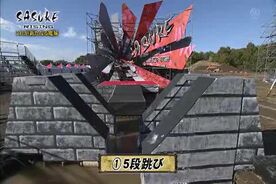
Godantobi, SASUKE 28
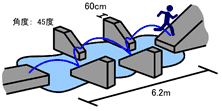
Drawing of the Godantobi
Other Appearances
SASUKE Ninja Warrior Indonesia
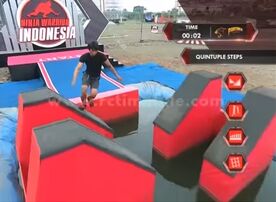
SASUKE Ninja Warrior Indonesia's Quintuple Steps in Challenge Stage
On SASUKE Ninja Warrior Indonesia, the Godantobi appeared as the first obstacle during both Challenge Stage and Semifinal Stage 2. However, the obstacle was called as the Quintuple Steps (referred to G4's Ninja Warrior name for the Godantobi, not the Quintuple Steps). The Quintuple Steps itself would later appear as the first obstacle during Challenge Stage on the next season.
Unlike in SASUKE (where the competitors must step all the four steps), several competitors only used either the left or right side of the steps to complete the obstacle.
SASUKE Vietnam

SASUKE Vietnam 2's Godantobi
On SASUKE Vietnam 2, Nhảy Bước 4 (SASUKE Vietnam's offical name for the Godantobi) appeared as the first obstacle in Stage 1A and 1B, which was similar to one used on SASUKE Ninja Warrior Indonesia (since several competitors only used either the left or right sides of the steps to complete the obstacle). However, the color scheme was similar to the Rokudantobi from SASUKE 19 to SASUKE 22, or the Step Slider in SASUKE 26 and SASUKE 27.
The obstacle was replaced by Step Slider (called locally as Nhảy 4 Bước) on the next season.
Competitors' Success Rate
- All results based on the TBS broadcast and external information found
| SASUKE | Clears | Attempts | Percentage |
|---|---|---|---|
| 8 | 50 | 100 | 50% |
| 9 | 86 | 100 | 86% |
| 10 | 81 | 100 | 81% |
| 11 | 75 | 100 | 75% |
| 28 | 68 | 100 | 68% |
| Total* | 360 | 500 | 72% |
- Notes: In a special before SASUKE 15, the completion percentage was said to be 292 clears out of 400 attempts. However, it was unknown (besides SASUKE 8) how well competitors did in a specific tournament.

